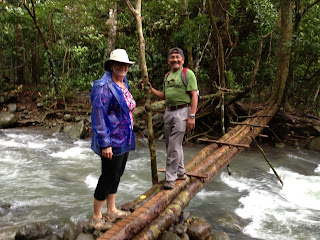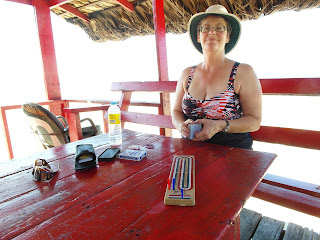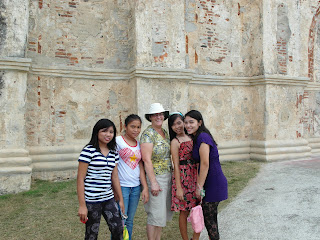Even though Christmas is very definitely a religious event in the Philippines, they sure do like to decorate. Colourful stars and lights are on everything that stands still, and on a lot of things that move! Evergreen trees are in short supply, but they can create Christmas trees out of almost everything. We have seen a bamboo pole with guy wires, ringed with lights and vines and tiny balls, and displays in front of the town hall that are merely geometric shapes and lights.
 We spent the days before Christmas visiting relatives. We
traveled by bus mostly, trying to avoid being involved in the tricycles’ unique
games of chicken with the rest of the traffic. One of our nieces lives in a
small house on her father-in-law’s farm. This farm is diverse, and has crops as
well as a banana grove and fruit trees. Chickens, goats, ducks and three cows
live there. These are not dairy cows. They are the India style cattle that can
handle the sun and heat and bugs and they are used as beasts of burden.
We spent the days before Christmas visiting relatives. We
traveled by bus mostly, trying to avoid being involved in the tricycles’ unique
games of chicken with the rest of the traffic. One of our nieces lives in a
small house on her father-in-law’s farm. This farm is diverse, and has crops as
well as a banana grove and fruit trees. Chickens, goats, ducks and three cows
live there. These are not dairy cows. They are the India style cattle that can
handle the sun and heat and bugs and they are used as beasts of burden.  The farm also had a
series of small, deep fish ponds that they fish in an unusual way. We watched
them drain the pond as much as possible, given that it is spring fed, and
expected to see fish flopping around ready to be netted. However, the fish are
survivors, too, and there were very few to be seen as they quickly buried
themselves in the top layer of the soft, wet mud. To be caught, the fishermen
and a couple of eager boys had to dig both hands into the muddy bottom of the
pond and feel around until something moved. Then it was a great game of chase
and elude until one was triumphant, the hunter or the prey. When the farmers
felt they had enough, the pond was allowed to refill and the survivors to
reproduce. After years of sitting in the back of a canoe reading a book while
hubby tries to tempt a fish to take his bait at the end of a fishing line, I am
learning a whole new enjoyment of the sport.
The farm also had a
series of small, deep fish ponds that they fish in an unusual way. We watched
them drain the pond as much as possible, given that it is spring fed, and
expected to see fish flopping around ready to be netted. However, the fish are
survivors, too, and there were very few to be seen as they quickly buried
themselves in the top layer of the soft, wet mud. To be caught, the fishermen
and a couple of eager boys had to dig both hands into the muddy bottom of the
pond and feel around until something moved. Then it was a great game of chase
and elude until one was triumphant, the hunter or the prey. When the farmers
felt they had enough, the pond was allowed to refill and the survivors to
reproduce. After years of sitting in the back of a canoe reading a book while
hubby tries to tempt a fish to take his bait at the end of a fishing line, I am
learning a whole new enjoyment of the sport.
I don’t know what it was like for the 3 wise men in the
Jerusalem desert, but in the Philippines, they like to throw a party for
birthdays. Late on Christmas Eve, the partying began. Firecrackers were set off
with annoying regularity, until way past midnight. Music was played on the
street and the road was busy with people and vehicles. At 10pm, a gaggle of excited children tumbled
by on the way to midnight mass, which got the dogs barking. Two hours later, they came back laughing and all psyched up
for the highlight of the night - the presents and the special meal served for
the occasion. Long before I would wake up for the day, their Christmas was
already enjoyed. Once I got to sleep, that is.
After listening to the revelers of the night before, my hubby
spent a quiet Christmas morning with his sister and brother preparing for our
Christmas dinner. First job was to go to the market for the fresh ingredients. Since
their holiday was over, the market and all the stores were open and
keeping regular hours. We wandered among the stalls of flopping fish and
dismembered animals to get to the vegetables laid out on tables and in baskets.
Because the market is within walking distance, we were able to get back quickly
to watch my brother-in-law working the fire.
The main kitchen in the house has a sink, counter and fridge, but the
only cooking surface is a little 2 burner hot plate. When the weather is a
consistent 30 Celsius plus, cooking inside is never a good choice. So there is
a covered, concrete area just outside the kitchen in the back of the house. Here
they make any fires that they would need for grilling or roasting, using the
same techniques that hubby does when he is camping. More prosperous homes may
have a hibachi type grill that they would use. So, with no oven available, our
fresh chicken was wrapped in banana leaves to roast. Added to several dishes of
market fresh vegetables, we had ourselves a wonderful Christmas feast!
Merry Christmas, everyone!























